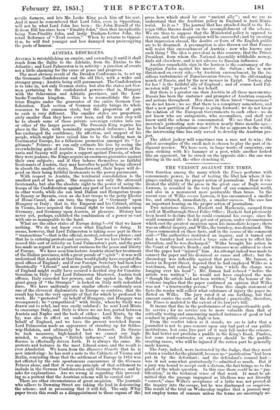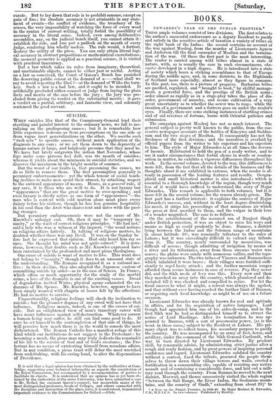THE VERDICT AGAINST THE TIMES.
ONE function among the many which the Times performs with consummate power, is that of testing the libel law where it im- pinges unduly upon the proper action of journalism. How it vin- dicated the utility of the press in the great case of Bogle versus Lawson, is recorded in the very heart of our commercial world, and also in a monument more perdurable than brass. In the recent case of Wilks versus Lawson, it has encountered a smaller foe, and attained, immediately, a smaller success. The case has an important bearing on the proper action of journalism.
Two notorious thieves, Hackett and Mackenzie, escaped from a cell at Marlborough Street Police Office ; Hackett had previously been heard to declare that he could command his escape, since he could command 201.: he did get out of prison, under circumstances which cast the greatest suspicion upon his immediate keeper ; there was an official inquiry, and Willis, the turnkey, was dismissed. The Times commented on these facts, and in the course of the comment said—" The authorities instituted an inquiry, and it turned out that a turnkey had received a large sum of money to effect his liberation, and he was discharged." 'Wilke brought his action in the Court of Queen's Bench ; and witnesses were adduced to show that the paper had "injured" him. An attempt indeed was made to connect the paper and his dismissal as cause and effect; but the chronology was inflexible against that pretence. Mr. Inman, a hosier in Regent Street, deposed that he had employed Wilks as a watchman, but refused to employ him " while the charge was hanging over his head" ; Mr. Inman had refused " before the article was written" ; he would not have employed the man " though the article had not been written," but the tenour of the evidence implies that the paper confirmed an opinion that Wilks was not " a trustworthy person." From this simple statement of facts the reader will collect what substance of injury the paper in- flicted on Wilks. The jury rated it at one farthing, but that amount carries the costs of the defendant ; practically, therefore, the Times is mulcted to the extent of its lawyer's bill. It incurs that fine in the performance of an unquestionable pub- lic service ; for no service can be more valuable than that of critically testing and announcing marked instances of good or bad conduct in public servants, high or low. From the verdict taken as it stands, we are to infer that a journalist is not to pass censure upon any bad part of our public institutions, lest some live part of it may fall under the censure. He had better not proclaim a puddle in the King's Road, Pimlico, lest some road-contractor or sweeper should be the puddle- creating cause, who will be injured if the rotten part be generally made known.
The Jury, indeed, were instructed by the Judge, that they must return a verdict for the plaintiff, because no " justification" had been put in by the defendant ; and the defendant's counsel had— was it not somewhat gratuitously ?—admitted as much. But if a jury was bound to accept such a dictum, the fact brings us to the pinch of the whole question. In this case there could be no " jus- tification," in. the technical sense of that word. It must be ad- mitted that the passage impugned as libellous was not literally " correct," since Wilks's acceptance of a bribe was not proved at the inquiry into the escape, but he was discharged on suspicion. The result of the trial on Wednesday implies that a journal may not employ terms of censure unless the terms are unerringly ac-
curate. But to lay down that rule is to prohibit censure, except on pain of fine ; for absolute accuracy is not attainable in any state- ment of events—the conflict of evidence, the treachery of the senses, the very impossibility of watching the force of every word in the syntax of current writing, totally forbid the possibility of accuracy in the literal sense. Indeed, even among deliberative assemblies, nay, on the judicial bench itself, you cannot attain it : establish the rule, and von put a padlock on the mouth of every judge, rendering him wholly useless. The rule would, a fortiori, destroy the utility of the press. You can only attain literal logi- cal accuracy in abstract propositions or mathematical exercitations ; the moment geometry is applied as a practical science, it is visited with practical inaccuracy.
But a law which takes its rules from imaginary, theoretical, and unattainable objects, cannot be either just or useful. Acting on a law so conceived, the Court of Queen's Bench has punished the deserving public censor at the demand of a—what shall we say to avoid repeating the libel ?—at the demand of Wilks the turn- key. Such a law is a bad law, and it ought to be mended. It artificially precluded either counsel or judge from laying the plain facts and merits of the case before the jury ; the jury was pre- cluded from giving its verdict on the substantial merits : it gave a verdict on a partial, arbitrary, and fantastic view, and solemnly sentenced the good servant.



























 Previous page
Previous page